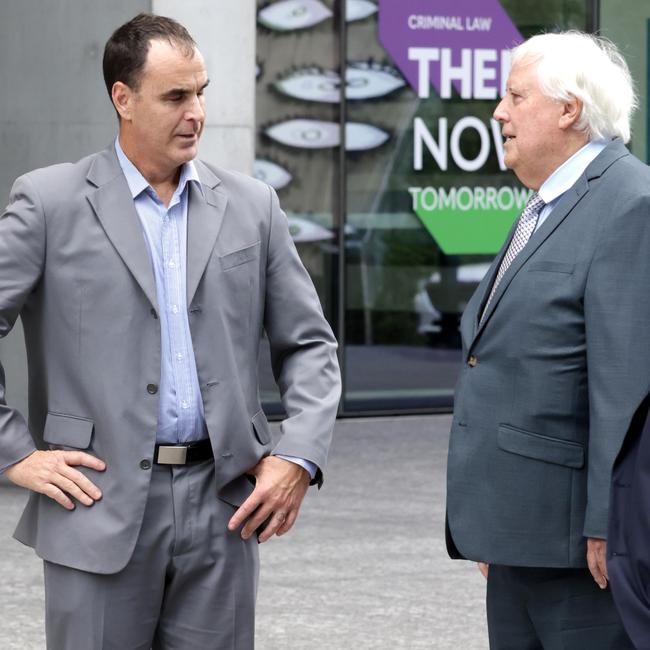Court ruling on vax mandate opens way for compo, return to work
This is how Clive Palmer brought down Queensland’s controversial - now “unlawful” - Covid mandates, creating a potential firestorm for thousands of public servants.
QLD News
Don't miss out on the headlines from QLD News. Followed categories will be added to My News.
Queensland public servants who were stood down or sacked after refusing to comply with Covid-19 vaccine mandates could be back to work and seek compensation following a landmark legal win by a group of police officers and paramedics.
Thousands of workers were stood down in the past three years after they baulked at mandatory jabs imposed by government departments following the pandemic outbreak.
The mandate applied to police, health, education, corrections and airport workers.
On Tuesday, 74 police and QAS staff won their two-and-a-half-year legal fight against the state government with Supreme Court Justice Glenn Martin finding the Queensland Police Service directive unlawful and the Queensland Ambulance Service directive was ineffective.
The decision, which employment lawyers are examining closely, may open the door for thousands of other public sector workers to take on the mandates in court on the grounds of human rights breaches.
Hours after it was handed down, Queensland’s richest man Clive Palmer announced he would look at backing a class action against the state government and seek to recoup $3m in legal costs he contributed in the case.
In his 115-page ruling Justice Martin ruled that the outgoing police commissioner’s vaccine mandate was unlawful because she failed to give proper consideration to the human rights of officers.
The veteran judge was highly critical of outgoing police commissioner Katarina Carroll’s responses to cross-examination and he labelled a key plank of her evidence “at best inconclusive and at worst unreliable”.
Justice Martin also found that Queensland Health’s former director-general John Wakefield had failed to prove that his mandate that QAS staff must get the jab was a term of their employment under their contracts.
Justice Martin ruled that Dr Wakefield’s direction to QAS staff was ineffective.

Even though Ms Carroll revoked the vaccine mandate on December 12, 2022, Justice Martin stated his finding of unlawfulness was still valid.
The QAS direction was also revoked by last September.
Asked if the decision would affect other public servants, lawyer Justin Sibley – who represented 54 police officers and staff in one of the three applications – told The Courier-Mail it was still to be considered.
The decision finds that the directive was unlawful and it protects only the 54 applicants. In the meantime lots of other police have been suspended then terminated,” he said.
Another law firm represented the other police and QAS staff.
“The QPS has taken a very draconian approach to those who questioned then did not comply with the directive and it created a coercion to be vaccinated,” Mr Sibley said outside of court.
“People are still being disciplined over these directions. There are police officers with a decade or more of experience who have never had any discipline in the past who have been terminated because they made a decision about their bodily autonomy,” he said.
In his decision, Justice Martin was scathing of Ms Carroll, calling her evidence about whether she gave “proper consideration to a relevant human right in making (the) decision” in issuing the mandate “vague and inconclusive”.
“She frequently could not recall how she received information or what the information was, and she frequently evaded these issues by referring in a vague way to briefings, discussions, summaries and the like.
Her evidence about considering either human rights compatibility assessment No 1 or human rights compatibility assessment No 2 was, at best, inconclusive and, at worst, unreliable,” the 17-year veteran of the Supreme Court bench stated.

Justice Martin noted Ms Carroll made the vaccination mandate 18 months into the pandemic, yet she told the hearing that she did not know whether any police officer who had contracted Covid-19 had given it to a colleague, or how many police had caught it from the community at work or transmitted it to community members at work.
Leading Queensland criminal lawyer Bill Potts told The Courier-Mail the judgment related to human rights and administrative and employment law.
“We have to remember of course that employment is a personal contract between an employer and an employee and like all contracts it can be negotiated or conditions can be placed in the contract of employment by commissioners or inspector generals,” he said.
“But they must note that they have considered their obligations regarding human rights including taking away a person’s employment and taking away a persons freedom regarding what they put in their bodies and balance that against the public safety.”
Speaking outside of court yesterday Mr Palmer said he was “happy” to fund further legal avenues to secure compensation for the police workers and paramedics.
“We could look at the class action for the ambulance workers and the police workers who have been subjected to harassment by their colleagues at the police department on the direction of the government to try to drop this case,” he said.
“But this case was never going to be dropped because I’m behind it.
“I don’t scare easily.”
Mr Palmer said he would seek costs from the government and would use that money to fight further legal battles. A police spokesman told The Courier-Mail last year that 201 QPS members were suspended for failure to comply with the mandatory vaccination directive including 116 police officers and 85 staff members.
A Queensland Health spokesperson said Justice Martin’s ruling did not impact doctors, nurses or its other employees.
Queensland Police Service said in a statement the service acknowledged the decision.
“We will carefully consider the judgment and our options moving forward,” the statement said.
Originally published as Court ruling on vax mandate opens way for compo, return to work




